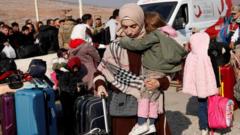Many refugees, like Ibrahim, an engineer living in Hatay, view returning as an opportunity to rebuild their homeland, despite concerns over basic living conditions and governance. Turkey's Foreign Minister Hakan Fidan has expressed support for their "safe and voluntary return," which aligns with sentiments among some Turks who believe it is time for refugees to go back. However, experts warn that a mass return may not happen immediately, as many refugees prefer to observe how Syria’s political landscape evolves.
Aside from the immediate logistical challenges of returning, significant questions linger about the state of infrastructure and security in Syria. The United Nations reports that 90% of Syrians live below the poverty line, which raises concerns about whether refugees returning will find adequate housing and services. Additionally, the threat of unexploded ordnance remains a grave concern for repatriating families.
As the situation continues to develop, experts emphasize the complexity of the decision facing Syrian refugees and the potential ramifications for both Turkish society and the future of Syria.
In summary, the choice facing Syrian refugees in Turkey is multifaceted, influenced by the desire to return home against a backdrop of uncertainty regarding living conditions and governance in their war-torn country. The traditional notion of refugees as a transient population is shifting, as many have built lives in Turkey and face complex decisions.
Aside from the immediate logistical challenges of returning, significant questions linger about the state of infrastructure and security in Syria. The United Nations reports that 90% of Syrians live below the poverty line, which raises concerns about whether refugees returning will find adequate housing and services. Additionally, the threat of unexploded ordnance remains a grave concern for repatriating families.
As the situation continues to develop, experts emphasize the complexity of the decision facing Syrian refugees and the potential ramifications for both Turkish society and the future of Syria.
In summary, the choice facing Syrian refugees in Turkey is multifaceted, influenced by the desire to return home against a backdrop of uncertainty regarding living conditions and governance in their war-torn country. The traditional notion of refugees as a transient population is shifting, as many have built lives in Turkey and face complex decisions.




















